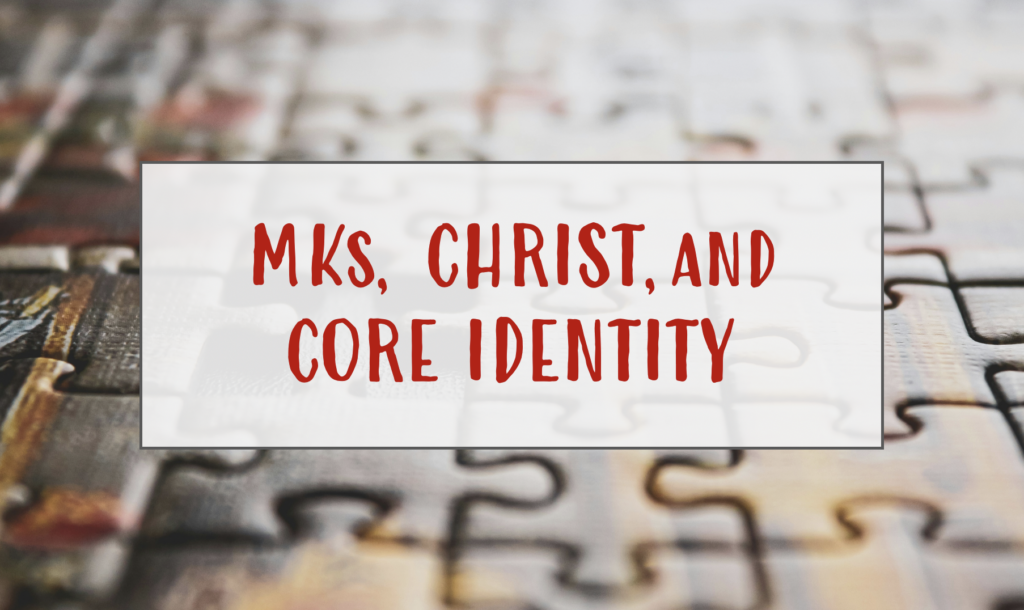[The audio version of this article is available on the Pondering Purple podcast.
Click HERE to listen or find it on your preferred podcast platform.]
In the years I’ve spent leading sessions about Third Culture Kids, I’ve referred to the traits we gain from growing up between worlds as our “Identity.”
We tend to be geographically aware. Adaptable. Multi-lingual. Inclusive. Relational. Agents of change…
And that’s what defines us—right?
Not entirely. The fruits of an international life certainly feel intimately linked to who we are, and they do impact how we function and interact in the world. They resonate in our core and are central to our perspective and our life.
But is being MKs truly our core identity? And if it isn’t, what is?
Though being TCKs is woven into our internal complexity, our relationship to that background is constantly changing—dependent on context, community, stage of life…even transient emotions.
This makes of our MK-ness, at best, a fragile foundation.
Putting too much stock in an identity based almost solely on circumstances and traits can be a risky proposition, because as that foundation inevitably shifts, the support beams that frame our identity will too.
That doesn’t mean that being an MK is insignificant.
It is actually an important aspect of my own identity. It impacts my sense of belonging, of positioning on this planet, of purpose, and of self. It informs my response to social issues, current events, interpersonal challenges, and vocational ambitions. It inspires investment in complex causes, a nuanced curiosity, and an openness to exploring and validating points of view that are different than mine.
But is my MK-ness the core of my identity? Is it the safe spine on which I can build my whole self and from which I can derive immutable stability?
If you’ve deduced from any of the resources I’ve published that my answer to those questions is yes, please allow me this moment to clarify my stance.
The correct answer is no.
As intrinsic as our MK-ness may be, it is still an add-on to the worth and wonder woven into our being—into our longing and existing—by the God whose power, in poet Lucy Shaw’s words, “hurled a universe.” The same God whose love led him to shrink himself down into a mortal form that could be crucified for me.
Only that kind of unassailable authority and fierce self-sacrifice can offer a true, stable, and lasting foundation for our souls’ Identity.
I’m not suggesting that we ignore the traits we’ve gained as global nomads raised in ministry. They are immeasurable gifts from that same loving God. But they are not our core identity.
I’ve seen young people cling to the term MK or TCK with almost religious zeal, refusing to bend or merge or change. In those cases, it often became a fragilizing thing. Limiting and alienating. Frustrating and frangible.
This I know to be true:
God’s image in us runs deeper than the places and experiences that feel like they define us.
What our MK-ness does is lend color and texture to our existence as it layers itself over the core value, connection, and purpose that were already in us before we first breathed—instilled in us by the Creator himself.
Founding our primary identity on Him expands our self-perception, not delegitimizing the formative impact of being an MK, but deepening our sense of self to include a less circumstantial perspective.
Rick Warren wrote, “The concrete, solid, gospel truth is that you are who God says you are, and no one else has a vote in the matter.”
How true.
How freeing.
Neither location, nor relationship, nor achievement, nor vocation can erode that kind of sureness.
Rather than defining ourselves by our experiential and cultural backgrounds, we’ve been given the gift of assessing our core value and meaning according to the unchangeable vision of the One who created us.
We are so much more than our geographical savvy and adaptability, as valuable as those are. We are who God says we are—and that is not affected by culture, stage of life, or location. It was hardwired into the fabric of our souls, and nothing—nothing—can undo it.
There is power in founding our identity in Christ.
Just as Jesus was able to fulfill his mission and endure the hardships, accusations, and pain of his life because he knew who he was in God, we too can face the uncertainties and upheavals of our own lives if we know all we are because of whose we are.
(A brief parenthesis here: I need to acknowledge that not all MKs have a relationship with God. I was one of them until my early twenties. Many either can’t seem to “access” him or—often for good reason—want nothing to do with him. For these precious souls, encouraging them or pressuring them to focus on “who they are in Christ” will likely do more to push them away from him than toward him.
If you’re one of those, I want you to know that you are worthy exactly as you are. I see you and I honor the intrinsic value in you.
And if you’re someone who loves one of those MKs, my encouragement to you is to continue doing just that—loving them without expectation or condition. Identity in Christ cannot be imposed. It must be first be witnessed, then tasted, chosen, and embraced.)
Stephen LeBlanc compiled a beautiful list of just about everything the Bible says about who we are in Christ. (View the brief video here.) These assertions and promises form an interwoven foundation that will not and cannot be swayed by the surprises, losses, confusions, challenges, and even accomplishments of a multi-cultural life.
I’ve picked out my favorites for the following list, which I’ve uploaded in printable form here.
But before I go any further, I need to say this clearly—in case you’re an MK like me who grew up believing that my identity in Christ was a whip forcing action, not a gift in which I could simply rest:
if any of the words below make you feel guilt for not doing enough or not being enough, please take a moment to pause. Consider. Ask God to whisper.
Your core identity is not a to-do list.
No—your core identity is already cherished and valued by a gentle, caring, and embracing God.
In Christ, you are His –
- Child
- Friend
- Chosen
- Beloved
In Christ, you have been –
- Redeemed
- Set free from the kingdom of darkness
- Forgiven all your failures
- Given the Holy Spirit
- Justified freely by His grace
In Christ, you have been given –
- All things pertaining to life
- Great and precious promises
- Authority over the enemy
- Unfathomable wisdom
In Christ, you are –
- Complete
- Loved eternally
- A candle in a dark place
- A citizen of heaven
- Sheltered by His wing
In Christ, you can have –
- Access to the Father
- An anchor to your soul
- A hope sure and steadfast
- Peace with God
In Christ, you can –
- Do all things
- Experience mercy
- Come boldly to His throne
- Declare liberty to the captives
- Defeat and overcome the enemy
We are everything listed above, vested in us by God and grounded in His love for us.
When we claim these Truths as our core identity, the fluctuations of relationships, fulfillment, and location will matter so much less.
And when we claim these truths as fundamental to our sense of self, they will release the white-knuckled grip some of us have on “being an MK” and they’ll allow for the fulfillment, healing, purpose, and connection that can only be found in an identity that is grounded entirely and solidly in Christ.
Please join the conversation!
-
- Contribute your thoughts in the comments section below
- Use the social media links to Like and Share this article
- Many of these articles are now available in podcast form. Simply search for “Pondering Purple” on your usual pod platforms, or click this link to be taken to its host page
- To subscribe to this blog, email michelesblog@gmail.com and write “subscribe” in the subject line
- Pick up Of Stillness and Storm (my novel about a missionary calling gone awry) on Amazon







